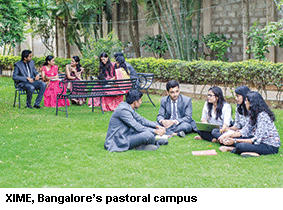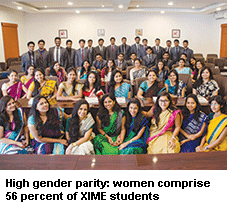Displaying entrepreneurial zeal and capability rare among academics, former IIM-Bangalore director Prof. J. Philip has nurtured the Xavier Institute of Management & Entrepreneurship into a nationally reputed B-school with campuses in Bangalore, Kochi and Chennai Sujata Choudhury
 To celebrate its silver jubilee year in a purposive and socially beneficial manner, the Bangalore-based Xavier Institute of Management & Entrepreneurship (XIME, estb. 1991) inaugurated its third fully-residential campus in Oragadam, on the outskirts of Chennai, on July 29. The inauguration of XIME’s 90,000 sq. ft campus by R. Seshasayee, chairman of IT software and services major Infosys Technologies Ltd, has been widely welcomed in Tamil Nadu, which despite being ranked India’s #1 industrialised state (Business Today, October 10, 2016), is deficient in top-ranked business management institutes. This southern seaboard state’s most famous B-school is the Great Lakes Institute of Management, promoted by former Kellogg School of Management professor Bala V. Balachandran in 2004.
To celebrate its silver jubilee year in a purposive and socially beneficial manner, the Bangalore-based Xavier Institute of Management & Entrepreneurship (XIME, estb. 1991) inaugurated its third fully-residential campus in Oragadam, on the outskirts of Chennai, on July 29. The inauguration of XIME’s 90,000 sq. ft campus by R. Seshasayee, chairman of IT software and services major Infosys Technologies Ltd, has been widely welcomed in Tamil Nadu, which despite being ranked India’s #1 industrialised state (Business Today, October 10, 2016), is deficient in top-ranked business management institutes. This southern seaboard state’s most famous B-school is the Great Lakes Institute of Management, promoted by former Kellogg School of Management professor Bala V. Balachandran in 2004.
The establishment of XIME’s third campus is a landmark achievement for Prof. J. Philip, who, after having served as director of the premier Indian Institute of Management-Bangalore (IIM-B, estb. 1973) from 1985-91, put his academic and administrative experience to good use by promoting XIME on a modest scale with an initial capital of only Rs.60,000 inside a nondescript asbestos shed in the compound of St. Martha’s Hospital in central Bangalore. Since then, displaying entrepreneurial zeal and capability rare among academics, Philip has steadily nurtured XIME into a full-fledged, highly respected national B-school with wholly-residential campuses at Bangalore, Kochi and Chennai with an aggregate capacity of 420 graduate students mentored by 50 faculty. One of XIME’s unique features is high gender parity with women comprising 56 percent of students in its flagship Bangalore campus.
With the country’s six major IIMs (the remaining 14 are floundering in shallows and misery because of massive faculty shortages) admitting a mere 3,700 of the 232,000 college graduates countrywide who write the IIMs’ CAT (Common Admission Test) annually, under Prof. Philip’s leadership, XIME has quickly established a national reputation as a next rung B-school. The institute is consistently ranked within the Top 50 among the country’s 4,000 B-schools in the annual league tables of Businessworld (#40), Business Today (#49), Business Standard (#19) and Outlook (#35), while the Union ministry of human resource development ranks it #30.
Over the past 25 years, the institute has become a happy hunting ground of corporates such as Infosys, Tata Consultancy Services, KPMG, HSBC, Deloitte, Ernst & Young, Amazon, ICICI Prudential, Samsung, and Accenture among others, whose managers are regular visitors to its Bangalore and latterly the Kochi campus, giving the institute a 100 percent placement record.
Although by IIM-A, B and C standards, XIME graduates’ average start-up remuneration is modest at Rs. 6.55 lakh per year in Bangalore and Rs.6 lakh in Kochi, several XIME alumni have risen to the top of highly reputed companies. Among them: Shailesh Menezes, country manager at Hewlett Packard; Chandan Mishra, director of PricewaterhouseCoopers; Abhijit Verma, associate director & partner, KPMG; and Rahul Maroli, vice president, Ola Cabs.
History
 A law graduate of Kerala University, Philip switched streams and signed up for a two-year Master’s programme in personnel management and industrial relations at XLRI in 1958. Quite obviously, he was an outstanding student because, after graduation, he was invited to join the XLRI faculty where he taught HR and management subjects for 11 years (1960-71). XLRI sent him to Harvard for the prestigious international teachers’ programme in business management in 1965.
A law graduate of Kerala University, Philip switched streams and signed up for a two-year Master’s programme in personnel management and industrial relations at XLRI in 1958. Quite obviously, he was an outstanding student because, after graduation, he was invited to join the XLRI faculty where he taught HR and management subjects for 11 years (1960-71). XLRI sent him to Harvard for the prestigious international teachers’ programme in business management in 1965.
In October 1971, Philip was appointed principal of the Management Training Institute of the public sector steel manufacturing behemoth, Steel Authority of India (SAIL), which in the 1970-80s was chalking up a weekly loss of Rs.1 crore. During a successful eight-year stint at SAIL, Philip’s reputation had spread to the private sector.
In 1980, Biki Oberoi, vice chairman of Oberoi Hotels Ltd, which owns more than 20 luxury hotels in India and abroad, appointed Philip vice president (human resources) of the globe-girdling Oberoi Group, with the brief to develop the management cadre of the hotel chain and strengthen its human resources management system.
After serving with the Oberoi Group for over five years and substantially revamping its HR system, in 1985 Philip heeded a call from the Union government (at considerable financial sacrifice) to take charge as director of IIM-Bangalore, where he served a six-year term and retired in 1991. “When I joined IIM-B on April 15, 1985, the institute was experiencing continuous support staff agitations. Indiscipline was rampant and faculty morale was low. I took a tough line to restore discipline and order on campus and with the full support of faculty and students, gradually placed the institute on a growth trajectory and established it as a national institute of excellence,” recalls Philip. Moreover, during his term in office at IIM-B, Philip networked the country’s most reputed B-schools and established the Association of Indian Management Schools (AIMS), of which he was elected the first president in 1988.
However, during his IIM-B stint, Philip suffered a grave personal setback when his daughter Maria, a Masters student of personnel management at the Madras School of Social Work, died in a train accident in 1986. “Maria was an exceptionally brilliant student and an idealist who always insisted that I use the vast experience I had accumulated in academia and industry to promote a high quality, affordable B-school for the thousands of talented youth who couldn’t make it into the IIMs. After her death, I was determined to fulfil her dream and promoted XIME. I attribute the success of XIME to the inspiration she gave me,” he recalls.
Bangalore campus
Sited in Electronics City, which hosts the head offices of Infosys and biotechnology major Biocon, among others, XIME’s hi-tech wifi-enabled Bangalore campus, spread over 4.3 acres, offers the flagship two-year full-time postgraduate diploma programme in management with specialisations in finance, HR, marketing, operations and international business. The institute’s 360 students are mentored by 26 high-quality faculty including 12 Ph Ds, 12 industry and two civil service veterans. The facilities on campus include 17 fully-wired classrooms, a library with 26,000 print volumes and 180 journal subscriptions, a computer centre with 200 PCs, a well-equipped gymnasium, various games facilities, student hostels etc. A measure of the corporate respect XIME Bangalore enjoys is that the well-respected Tata Trust has built the XIME library, Oberoi Group the auditorium, and Biocon the main executive hall, for naming rights.
Unsurprisingly, against its annual intake of 180 graduate students, in the year 2016, the institute received 3,955 admission applications.
Kochi campus
Inaugurated in 2013, the compact and aesthetically designed XIME, Kochi campus sited within the Kerala Industrial Infrastructure Development Corporation’s Hi-Tech Park in Kalamassery, has certified 110 students so far who have been snapped up by corporations such as Wipro, State Bank of India and KPMG, among others.
Comments XIME Kochi’s officiating director Dr. Manoj Varghese, an alumnus of XLRI with a Ph D from Aligarh Muslim University and former director of Facebook India: “Within three years, we have established XIME-Kochi as Kerala’s #1 private sector B-school. We have an excellent group of 120 students with a high level of gender and geographical diversity. The average annual salary of our graduates this year was Rs.6 lakh, high by Kerala standards.”
Chennai campus
Constructed with an initial investment of Rs.25 crore, XIME’s fully-residential Chennai campus, inaugurated on July 29, was scheduled to admit its first batch of 120 graduate students this July. However, it has to wait for another year to receive the necessary approvals of the Delhi-based All India Council for Technical Education (AICTE). XIME Chennai’s associate dean M. Shashidhar, a business management graduate of BITS, Pilani with 34 years of experience in management consultancy, puts a brave face on this typical bureaucratic delay. “This is undoubtedly a setback for us. However, we are focusing on executive development programmes, for which no official permission is required. Moreover, we are confident of getting AICTE approval for admitting 120 students in the next few months,” says Shashidhar.
Future plans
After having served in corporate India and business management education for over half a century, Philip is optimistic about the future of the post-1991 liberalised Indian economy. “Liberalisation of the economy, particularly of antiquated commercial taxes, land purchase and labour laws, has re-ignited the spirit of India’s free enterprise tradition. Likewise, there is an urgent need for management education also to be liberated from stifling bureaucratic controls. Right now, B-schools are hostage to AICTE’s approval for introducing new courses, establishing a new branch or offering a joint degree programme with a foreign B-school. These constraints need to be struck off to enable business education to produce well-trained and globally oriented managers in sufficient numbers,” says this never-say-die edupreneur who is drawing up plans to promote a fourth XIME institute either “in India or abroad”.